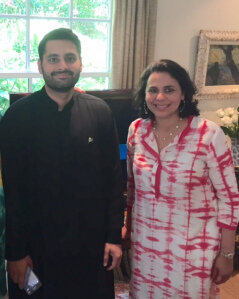Pakistan Zindabad - Jibran Nasir
Over 1200 people have died in Pakistan in the past week, not from natural disaster or a terrorist attack, but from debilitating heat. Temperatures are reaching 120 degrees Fahrenheit; there’s no water or electricity for days in some areas; laborers, street hawkers, pedestrians and others are out in the heat for hours; and there are few trees or covered areas for shade. Compounding the situation, it is the month of Ramadan and people are fasting; and continuing to fast even if they feel ill. City mortuaries are full; there are few cool places to store dead bodies; and mass graves are being dug.In the midst of one of the worst calamities in Pakistan’s recent history, Mohammad Jibran Nasir, a 28-year old lawyer turned social activist, is taking charge of a situation that has confounded the government. He’s directing an army of volunteers, via social media, with the urgency of a firefighter and the compassion of a parent.I had a chance to get to know Jibran last month when he stayed with us for a few days, as he toured the U.S. sharing his vision for what is possible in Pakistan. I was moved by his maturity, his heartfelt passion for his country, and his unflinching commitment to carry through a responsibility he stepped into; and I felt fearful for his safety.During this latest crisis, he’s been posting videos on his Facebook page that provide public service announcements about symptoms of heat stroke and how to prevent it; let people know where to donate water and oral rehydration salts (ORS); reveal the abysmal conditions of the hospitals; call out politicians for failing to deal with the situation; and urge people to step up and volunteer. In one video, inside one of Karachi’s largest public hospitals where heat stroke patients are supposed to get care, Jibran exposes the lack of air conditioning and the vile bathroom conditions. Within two days, his team, working through Elaj Trust, had brought in 18 AC units and the required generators; hired a janitorial company to clean the facility and maintain it for the month of Ramadan; and stocked hundreds of cases of water bottles. He ends his video updates with “Pakistan Zindabad” (Long Live Pakistan); and heads on to remedy the next situation, doing the job that government is failing to do. He is raising funds from private citizens in Pakistan and the U.S. In four days, he raised more than his goal of $25,000; then did something uncharacteristic in Pakistan -- urged people to stop donating more money, because they had enough. “Wow, one of the very few times I've heard something like that,” someone wrote on his Facebook page.Jibran has become the public face of a growing citizens movement, since the killing of almost 150 people, 132 of them children, in the Peshawar army school in December 2014. Well-known cleric Maulana Abdul Aziz of Lal Masjid (Red Mosque) refused to condemn the actions. The ruthless attack against school children and the cleric's sympathy towards the Taliban was Jibran's final wake-up call. He decided to peacefully protest in front of Lal Masjid; four people joined him the day after the attack. That night, Jibran made a Facebook event; the next day, 400 people were there. The protests resulted in an 'first information report' (FIR) being issued against Aziz, obliging police to investigate because of threats he had made against Nasir and the other activists. That night, the trending hash tag was #jibrannasirisahero. Momentum gathered and a diverse group of citizens became charged and engaged to demand change. “People were gearing up and saying, ‘what next Jibran, what next’. And suddenly I found myself made into something that progressed into a movement,” Jibran tells me as he recounts what happened in the days right after the Peshawar attacks. “Now I thought, what do I do with this. I knew I had to get people off the streets and onto the media, so this information could get everywhere.”Jibran is leading a citizen’s movement to counter religious extremism and terrorism in Pakistan. "When violence becomes a way of life, people become desensitized and dehumanized," said Jibran at The Atlantic Council in Washington D.C., during his recent 40-day U.S. speaking tour. "Even people on whom violence is inflicted are becoming immune to it."Jibran wants to provide a counter narrative. He has launched “Never Forget Pakistan” (#NeverForgetPK), a campaign to ensure that the thousands of Pakistanis who have lost their lives to terrorism and religious violence are always remembered. He is developing an online portal that will gather and share a plethora of information to inform, educate, and empower citizens and hold government and politicians accountable. For example, “#AajKeDin (today), will document sectarian violence each day, including who was targeted, which groups were involved, how many were killed, and so on, and mark the information on a map so there is a complete archive of every terror attack. #HamareHeroes (our heroes) will include stories of the people who were killed in extremist attacks, those who actively fought terrorism, and those who died trying to save others. “It’s not enough to point out who the villains are, we also need to know who our heroes are,” Jibran said. "We need to talk about our victims as our heroes." He wants to capture people's stories and the impact that each loss of life has had on a family, a school, a community, a city, on all those affected by that individual. Another part of the portal is a free help line where people being threatened in the name of religion or falsely accused of blasphemy can record their information and seek help; as well as a citizen journalism app that will enable people to post photos and videos of hate speech or other dangerous activity so information can be gathered in one place and used more effectively."Can one person solve the situation of 200 million people with one NGO," he asks at an OPEN (Organization of Pakistani Entrepreneurs of North America) event last month in Virginia. "No! Every single Pakistani needs to put pressure on the government of Pakistan."It is a hugely ambitious project, nothing short of revolutionary. From what I know of Jibran, he is passionate, hard working, and fearlessly undeterred -- a potent combination, especially for someone working in one of the most intractable countries in the world.For more information about Jibran's work and to join the movement, please sign on to https://neverforgetpakistan.com

